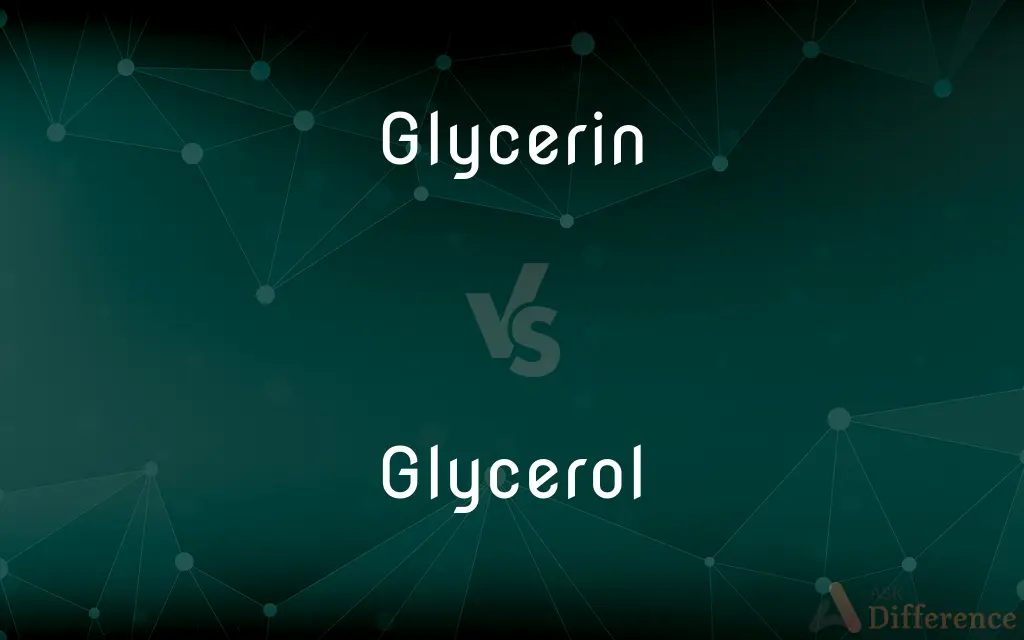Glycerin vs. Glycerol — What's the Difference?
Edited by Tayyaba Rehman — By Fiza Rafique — Updated on October 30, 2023
Glycerin is a commercial name for a syrupy liquid, while glycerol is the chemical name for the compound C3H8O3. Both terms often refer to the same substance used in various industries.

Difference Between Glycerin and Glycerol
Table of Contents
ADVERTISEMENT
Key Differences
Glycerin is commonly used in everyday language, especially in the cosmetic and pharmaceutical industries. Glycerol, on the other hand, is the term often used in scientific and technical contexts.
In terms of usage, glycerin is often seen on ingredient lists for products like soaps and lotions. Conversely, glycerol is typically used in scientific literature, research, and academic discussions.
Both glycerin and glycerol refer to a colorless, odorless, viscous liquid that is sweet-tasting and non-toxic. However, the context in which they are used differentiates them: glycerin in commercial settings and glycerol in scientific ones.
Although both terms technically refer to the same chemical substance, their usage reflects the audience and application. Glycerin is more prevalent in consumer goods, while glycerol is found in scientific nomenclature.
Comparison Chart
Usage
Commercial, everyday applications
Scientific, technical contexts
ADVERTISEMENT
Naming
Common, non-scientific name
Chemical name
Context
Ingredient lists, product labels
Scientific research, literature
Audience
Consumers, general public
Scientists, researchers
Perceived Usage
Skin care, food industry
Laboratory, chemical formulations
Compare with Definitions
Glycerin
A sweet, syrupy liquid used in cosmetics.
Glycerin was added to the lotion for extra moisture.
Glycerol
A substance used in laboratory settings as an antifreeze.
Glycerol was added to the solution to lower its freezing point.
Glycerin
A colorless, odorless liquid used in food as a sweetener.
Glycerin is used in this candy to enhance its sweetness.
Glycerol
A backbone molecule in lipids known as triglycerides.
Glycerol forms the foundation for many fat molecules.
Glycerin
A byproduct of soap making, used in skincare.
The soap contains glycerin for its moisturizing properties.
Glycerol
A reagent in chemical synthesis.
Glycerol was used as a reagent in synthesizing the new compound.
Glycerin
A solvent and plasticizer used in various industries.
Glycerin was used as a solvent in the paint formulation.
Glycerol
Glycerol (; also called glycerine in British English or glycerin in American English) is a simple polyol compound. It is a colorless, odorless, viscous liquid that is sweet-tasting and non-toxic.
Glycerin
A compound used in pharmaceuticals as a humectant.
Glycerin helps keep the cough syrup from drying out.
Glycerol
A colourless, sweet, viscous liquid formed as a by-product in soap manufacture. It is used as an emollient and laxative, and for making explosives and antifreeze.
Glycerin
Glycerol or a preparation of glycerol.
Glycerol
A syrupy, sweet, colorless or yellowish liquid triol, C3H8O3, obtained from fats and oils as a byproduct of saponification and used as a solvent, antifreeze, plasticizer, and sweetener and in the manufacture of dynamite, cosmetics, liquid soaps, inks, and lubricants.
Glycerin
(organic compound) glycerine.
Glycerol
(organic compound) 1,2,3-trihydroxy-propane or propan-1,2,3-triol; a trihydric alcohol
Glycerin
An oily, viscous liquid, C3H5(OH)3, colorless and odorless, and with a hot, sweetish taste, existing in the natural fats and oils as the base, combined with various acids, as oleic, margaric, stearic, and palmitic. It may be obtained by saponification of fats and oils. It is a triatomic alcohol, and hence is also called glycerol. See Note under Gelatin.
Glycerol
A syrupy sweet liquid obtained as a by-product in the manufacture of soap from animal or vegetable oils and fats; it is used as an antifreeze, a plasticizer, and a food sweetener and in the manufacture of dynamite, cosmetics etc.
Glycerin
A sweet syrupy trihydroxy alcohol obtained by saponification of fats and oils
Glycerol
Same as Glycerin.
Glycerol
A sweet syrupy trihydroxy alcohol obtained by saponification of fats and oils
Glycerol
A compound used in cryopreservation.
Glycerol helps protect cells during the freezing process.
Common Curiosities
Can glycerol be used in food?
Yes, glycerol is safe and can be used as a food additive.
Is glycerol flammable?
Glycerol is generally non-flammable.
Are glycerin and glycerol the same chemically?
Yes, they refer to the same chemical compound.
Is glycerin safe for skincare?
Yes, glycerin is widely used and considered safe for skincare.
Is glycerin vegan?
Glycerin can be plant-based (vegan) or derived from animal fats.
Is glycerol used in cryopreservation?
Yes, glycerol is commonly used in cryopreservation.
Can glycerol be used as a laxative?
Yes, glycerol can act as a laxative in medical applications.
Is glycerol used in scientific research?
Yes, glycerol has various applications in scientific research.
Can glycerin be used in hair care?
Yes, glycerin is often used in hair care products for hydration.
Can glycerin be used as a sweetener?
Yes, glycerin can act as a sweetener in food products.
Can glycerin expire or go bad?
Glycerin has a long shelf life but can degrade under certain conditions.
Is glycerin biodegradable?
Yes, glycerin is biodegradable.
Is glycerin found in nature?
Yes, glycerin is present in fats and oils in nature.
Does glycerol have a taste?
Glycerol is sweet-tasting.
Can glycerol be synthesized chemically?
Yes, glycerol can be synthesized in the laboratory.
Share Your Discovery

Previous Comparison
Scowl vs. Grimace
Next Comparison
Apartment vs. MaisonetteAuthor Spotlight
Written by
Fiza RafiqueFiza Rafique is a skilled content writer at AskDifference.com, where she meticulously refines and enhances written pieces. Drawing from her vast editorial expertise, Fiza ensures clarity, accuracy, and precision in every article. Passionate about language, she continually seeks to elevate the quality of content for readers worldwide.
Edited by
Tayyaba RehmanTayyaba Rehman is a distinguished writer, currently serving as a primary contributor to askdifference.com. As a researcher in semantics and etymology, Tayyaba's passion for the complexity of languages and their distinctions has found a perfect home on the platform. Tayyaba delves into the intricacies of language, distinguishing between commonly confused words and phrases, thereby providing clarity for readers worldwide.
















































